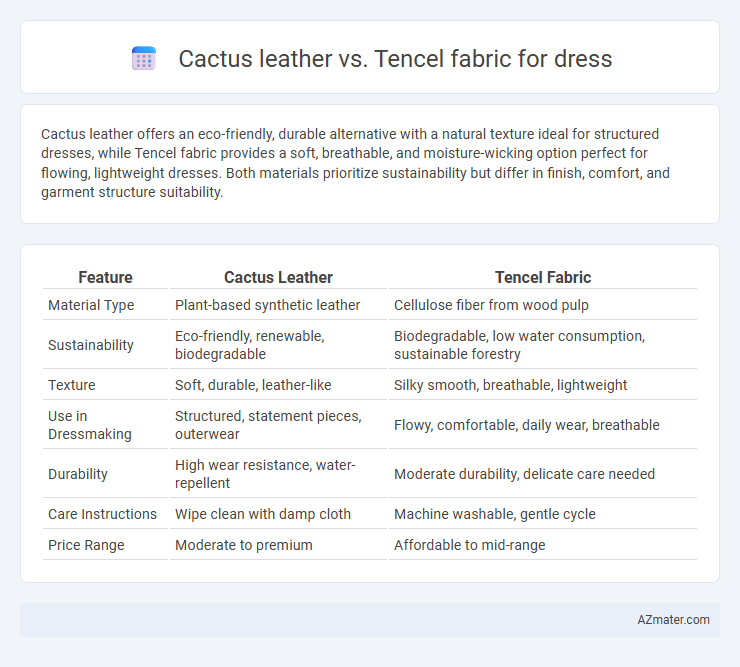Cactus leather offers an eco-friendly, durable alternative with a natural texture ideal for structured dresses, while Tencel fabric provides a soft, breathable, and moisture-wicking option perfect for flowing, lightweight dresses. Both materials prioritize sustainability but differ in finish, comfort, and garment structure suitability.
Table of Comparison
| Feature | Cactus Leather | Tencel Fabric |
|---|---|---|
| Material Type | Plant-based synthetic leather | Cellulose fiber from wood pulp |
| Sustainability | Eco-friendly, renewable, biodegradable | Biodegradable, low water consumption, sustainable forestry |
| Texture | Soft, durable, leather-like | Silky smooth, breathable, lightweight |
| Use in Dressmaking | Structured, statement pieces, outerwear | Flowy, comfortable, daily wear, breathable |
| Durability | High wear resistance, water-repellent | Moderate durability, delicate care needed |
| Care Instructions | Wipe clean with damp cloth | Machine washable, gentle cycle |
| Price Range | Moderate to premium | Affordable to mid-range |
Introduction to Sustainable Fabrics for Dresses
Cactus leather and Tencel fabric represent innovative sustainable materials gaining popularity in eco-friendly dress production due to their low environmental impact and renewable sources. Cactus leather, derived from mature nopal cactus leaves, offers a durable, biodegradable leather alternative with minimal water use and zero pesticides. Tencel fabric, made from sustainably sourced eucalyptus wood pulp through a closed-loop process, provides a soft, breathable, and biodegradable textile ideal for comfortable, eco-conscious dress designs.
What Is Cactus Leather?
Cactus leather is an innovative, sustainable material made from the mature leaves of the prickly pear cactus, processed into a durable, vegan-friendly leather alternative ideal for fashion items like dresses. Tencel fabric, derived from sustainably sourced wood pulp, offers a soft, breathable, and eco-conscious textile choice but differs in texture and production methods compared to cactus leather. While cactus leather provides a leather-like appearance with environmental benefits, Tencel excels in comfort and moisture management for dress fabrics.
What Is Tencel Fabric?
Tencel fabric is a sustainable textile made from the cellulose fibers of eucalyptus trees, known for its softness, breathability, and moisture-wicking properties, making it ideal for dressmaking. Cactus leather, an innovative plant-based alternative to traditional leather, offers durability and a unique texture but lacks the breathability and flexibility of Tencel. When choosing between the two, Tencel fabric provides a lightweight, eco-friendly option that enhances comfort and drape in dresses.
Environmental Impact: Cactus Leather vs Tencel
Cactus leather, derived from sustainable prickly pear cactus, uses minimal water and no toxic chemicals, significantly reducing its environmental footprint compared to traditional leather. Tencel fabric, made from sustainably sourced eucalyptus wood pulp through a closed-loop production process, offers low water usage and high biodegradability, making it an eco-friendly textile choice. Both materials present sustainable alternatives to conventional fabrics, with cactus leather excelling in water conservation and Tencel standing out for its renewable source and efficient manufacturing.
Comfort and Wearability Comparison
Cactus leather offers a vegan, cruelty-free alternative with a soft yet slightly textured surface that molds well to the body, providing moderate breathability but less stretch compared to Tencel fabric. Tencel, derived from sustainably sourced wood pulp, delivers exceptional moisture-wicking properties and a smooth, lightweight texture that enhances comfort and flexibility for all-day wear. While cactus leather excels in durability and unique aesthetic appeal, Tencel fabric ensures superior breathability and softness, making it ideal for dresses requiring fluid movement and comfort.
Style and Aesthetic Versatility
Cactus leather offers a rich, textured appearance with a natural matte finish that enhances modern and edgy dress designs, making it ideal for statement pieces and sustainable fashion enthusiasts. Tencel fabric boasts a smooth, silky texture with excellent drape and breathability, providing versatile aesthetics from casual to elegant styles with fluid movement. Both materials enable diverse dress silhouettes, but cactus leather emphasizes bold, structured looks while Tencel excels in soft, flowy designs.
Durability and Longevity
Cactus leather offers superior durability compared to Tencel fabric, making it well-suited for dress materials that require long-lasting wear. Its natural fibers and resistance to abrasion help maintain shape and appearance over time, while Tencel, made from cellulose fibers, provides softness but tends to wear out faster under frequent use. Choosing cactus leather enhances the longevity of dresses, especially in conditions demanding resilience and minimal maintenance.
Maintenance and Care Tips
Cactus leather requires minimal maintenance, as it is naturally water-resistant and easy to clean with a damp cloth, making it ideal for durable dresses. Tencel fabric, derived from sustainably sourced wood pulp, needs gentle care including hand washing or machine washing on a delicate cycle with cold water to prevent shrinking and maintain softness. Both materials benefit from air drying away from direct sunlight to preserve texture and color longevity.
Cost Analysis: Cactus Leather vs Tencel
Cactus leather, a sustainable alternative derived from mature cactus leaves, typically commands a higher price due to its artisanal production process and limited scalability, averaging around $100 to $150 per square meter. In contrast, Tencel fabric, made from sustainably sourced wood pulp through a closed-loop process, offers a more cost-efficient option, generally priced between $20 to $40 per meter, making it accessible for mass garment manufacturing. When analyzing costs for dress production, Tencel provides a budget-friendly, eco-conscious fabric choice, while cactus leather's premium cost reflects its niche market appeal and unique texture.
Choosing the Best Fabric for Your Next Dress
Cactus leather offers sustainable, vegan-friendly durability with a unique texture, ideal for eco-conscious dressmakers seeking a bold statement piece. Tencel fabric boasts exceptional breathability, softness, and moisture-wicking properties, making it perfect for lightweight, comfortable dresses in warm climates. Evaluating your priorities--whether durability and distinct style or softness and environmental impact--will guide the best fabric choice for your next dress.

Infographic: Cactus leather vs Tencel fabric for Dress
 azmater.com
azmater.com